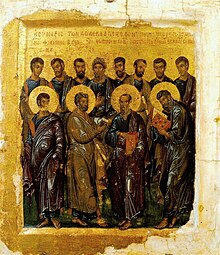
“There are two Ways, one of Life and one of Death, and there is a great difference between the two Ways.”
Thus begins The Didache. This is a first century anonymous writing which outlines the teaching of the twelve apostles. It’s simple. In it’s original Greek text I could print it off in about three pages. The structure is simple in that it briefly outlines Christian ethics, gives a few instructions for church rituals like baptism, and closes with a section on how to assemble the church community.
Three pages.
Contrast this with the Talmud where you can find page upon page of instruction. I’ve yet to sift through all of this but the little bit I read was detailed instructions on how to exactly follow the Law of God.
This oral tradition is part of what Jesus often spoke against in the New Testament. It seems that the commentary on the Law had become just as important as the Law itself. And this created a culture within Judaism. They were law-centered.
Now it’s not fully appropriate to compare The Didache to the Talmud as if they are one to one correspondents. They aren’t. They serve different functions. But I think we can learn something about a culture by the literature it produces. One was law-driven and the other was bound by relationship. Both have sections on ethics but one is detailed and the other is broad. Love governs different than law does.
I think we see this in action in Philippians 2. Paul instructs the Philippians with these words, “Let those of us who are mature think this way, and if in anything you think otherwise, God will reveal that also to you.” The “this way” is Paul’s humble Christ-centered view of the world. It’s his idea that he hasn’t yet taken hold of Christ but this is his one aim. It’s a more humble orthodoxy.
Paul, better than anyone, knows that God is able to radically change the theology of anyone at just one Word. And so he doesn’t flit away his time trying to bang notions into the head of people who disagree with him. He leaves that up to the Lord. If you’re mature in Christ then live like it. Look at the world through the lens of a crucified and risen Savior.
But we’ve been going out this church thing for a couple thousand years since that first band of followers penned Didache. And we’ve fallen a bit more Talmudic in our relationships and interactions with others. There are laws to govern everything within Christendom. And if you just so happen to differ with someone we don’t have to say “God will make it clear” we’ve got several social media platforms were we can yellalogue (that’s what you can call “dialogue” on social media).
So consider this a plea to return to Didache Christianity and leave those Talmudic impulses for the birds. We don’t need to be law-centered when in Christ we have everything we need for life and godliness. God is big enough to bring every one of His children home—even the ones who disagree with us on non essentials.
Consider these words from John Newton:
Whatever it be that makes us trust in ourselves that we are comparatively wise or good, so as to treat those with contempt who do not subscribe to our doctrines, or follow our party, is a proof and fruit of a self-righteous spirit. Self-righteousness can feed upon doctrines, as well as upon works; and a man may have the heart of a Pharisee, while his head is stored with orthodox notions of the unworthiness of the creature and the riches of free grace.
—
Photo source: here